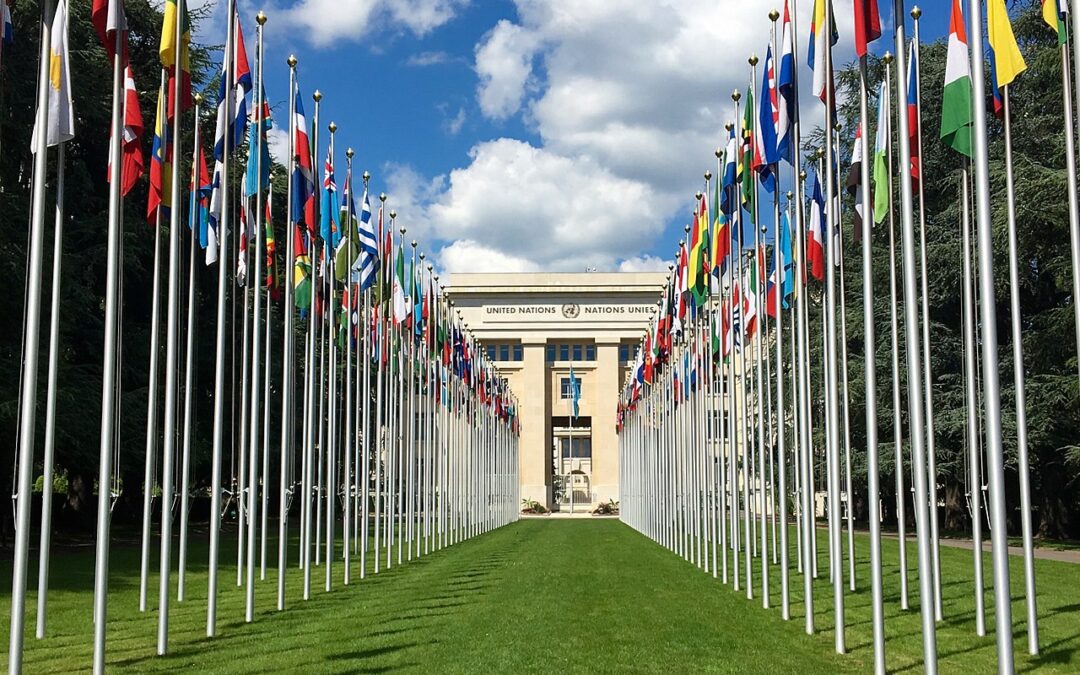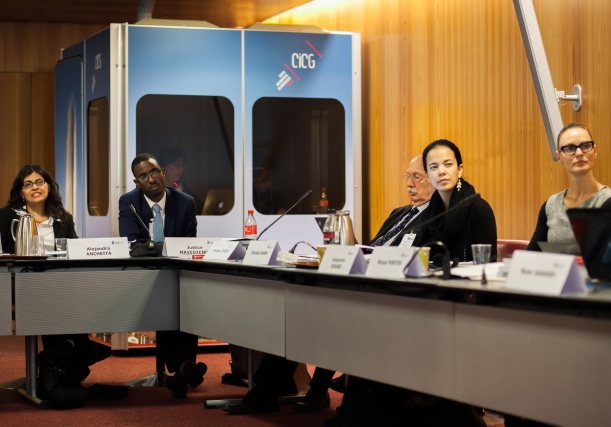
Nov 26, 2019 | News
Three exceptional women – Huda Al-Sarari, Norma Ledezma and Sizani Ngubane – are the finalists for the 2020 Martin Ennals Award, a demonstration of the leading position now occupied by women in the defence of human rights. The ICJ is member of the MEA Jury.
In Yemen, Huda Al-Sarari has exposed and challenged the existence of secret prisons and many cases of torture.
In Mexico, Norma Ledezma is fighting against femicides and disappearances.
In South Africa, Sizani Ngubane is fighting for access for women to education and to land.
Three women nominated: a first
Each year, the Martin Ennals Award rewards human rights defenders from around the world who distinguish themselves by their strong commitment to promoting human rights – often at the risk of their own lives.
In 2020, for the first time the Jury nominated three women who defend the fundamental rights of their communities in sensitive contexts.
“The Martin Ennals Foundation is proud to recognize the courageous work of three women. For the 2020 edition, our Jury’s choice reflects the ever-greater global impetus of individuals – whatever their gender – who are committed to respect for human rights and women’s rights in particular,” said Isabel de Sola, Director of the Martin Ennals Foundation.
“The finalists for the 2020 Martin Ennals Award work on different continents, but all three have in common their resilience, determination, a tremendous rigour and, finally, the positive and concrete impact of their work,” added Hans Thoolen, Chairman of the Jury.
In Yemen, where the conflict has been ongoing since 2005, Huda Al-Sarari, a Yemeni lawyer, unveiled the existence of several secret detention centres where the worst violations of human rights were committed: torture, disappearances or even extrajudicial executions.
In South Africa, women face discrimination, the worst expression of which is widespread gender violence. In rural communities, they frequently have their land expropriated and are deprived of access to education and justice. Sizani Ngubane founded an organization of more than 50,000 women from rural areas in her country and has fought successfully for over 40 years for the recognition of their rights.
In Mexico, the civil population is paying a high price for the weakness of the rule of law which is underpins widespread violence and impunity. Women are the primary victims, with more than 3,500 femicides committed each year. Norma Ledezma, who is the mother of one of the victims, puts all her energy into supporting families seeking access to justice in the state of Chihuahua.
The finalists were selected by a jury made up of representatives of ten of the world’s leading human rights organizations: the ICJ, Amnesty International, Human Rights Watch, Human Rights First, International Federation for Human Rights, World Organisation Against Torture, Front Line Defenders, EWDE Germany, International Service for Human Rights and HURIDOCS.
The 2020 Martin Ennals Award will be given to one of the three finalists on 19 February 2020 at a livestreamed public ceremony. The event is hosted by the City of Geneva which, as part of its commitment to human rights, is a longstanding supporter of the Award.
Contact
Olivier van Bogaert, Director Media & Communications, ICJ representative in the MEA Jury, t: +41 22 979 38 08 ; e: olivier.vanbogaert(a)icj.org
Chloé Bitton, Communications Manager, Martin Ennals Foundation, t +41 22 809 49 25 e: cbitton(a)martinennalsaward.org
Universal-MEA2020bios-News-2019-ENG (full bios of finalists, in PDF)
Universal-MEA2020bios-News-2019-ARA (full story and bios of finalists in Arabic, PDF)

Mar 5, 2019 | News
States at the United Nations Human Rights Council in Geneva should ensure that Egypt is not allowed to seize a leading role in relation to the mandate of the United Nations’ expert on human rights and counter-terrorism, nine international human rights organizations, including the ICJ, have said.
In light of Egypt’s record of severe and widespread abuse of counter-terrorism measures to violate human rights, the organizations warned against attempts by Egypt to undermine the expert’s mandate.
The mandate of the UN Special Rapporteur on the promotion and protection of human rights and fundamental freedoms while countering terrorism is due to be renewed in the coming weeks at the ongoing Human Rights Council session in Geneva.
Mexico has for many years led the resolution that established and maintained the expert, but is understood now to be in discussions with Egypt about a possible leadership role for Egypt.
Other changes to the resolution text may also be under consideration.
“Egypt has an appalling record of abusing counter-terrorism measures against human rights defenders and other dissenting voices, and was recently denounced by the UN Special Rapporteur on human rights defenders for severe reprisals against people who spoke with another visiting UN expert,” said Matt Pollard, Senior Legal Adviser and UN representative for the ICJ.
“To give such a country shared leadership on the renewal of the mandate of the UN’s expert on human rights and counter-terrorism would only do further harm to civil society and others in Egypt and elsewhere, undermine the work of the expert and the UN as a whole, and badly tarnish the long history of leadership Mexico has shown on these issues,” he added.
Nine organizations – ICJ, Amnesty International, ARTICLE 19, Cairo Institute for Human Rights Studies, CIVICUS/World Alliance for Citizen Participation, International Federation for Human Rights (FIDH), Human Rights Watch, International Service for Human Rights, and Privacy International – had earlier sent a joint letter to all countries representatives in Geneva highlighting their concerns.
This was followed by a joint oral statement at the Human Rights Council session on 1 March, during an interactive dialogue with the special rapporteur.
Egypt has gradually sought to dilute or distort the longstanding focus of the UN Human Rights Council’s work to protect and promote human rights and fundamental freedoms while countering terrorism, the groups said.
In 2018 it succeeded in watering down the council’s longstanding thematic resolution on the topic, in which states annually recognize concerns about abuses and urge respect for human rights at a global and abstract level.
However, any move to gain control over the resolution on which the mandate of the special rapporteur depends, or to dilute or reframe her mandate, would have far deeper and further-ranging damaging effects.
The special rapporteur acts on individual complaints, reports on the situation in particular countries, and addresses in detail topics relating to counterterrorism work around the world on an ongoing basis.
The special rapporteur also serves an essential function in providing independent oversight of counterterrorism measures from a human rights perspective within the overall UN system.
The mandate holds a uniquely important role in the UN counterterrorism architecture, as the only UN entity with the exclusive mandate to ensure the promotion and protection of human rights while countering terrorism.
The organizations have been urging other countries to strongly oppose any attempts to weaken the mandate of the special rapporteur.
The special rapporteur’s role should not be diluted by including the flawed Egyptian-led approach into the resolution for its renewal, or by sharing the leadership of the mandate renewal resolution with Egypt or other countries that have such an appalling record in relation to the very issues the mandate is to address, they said.
Allowing Egypt to jointly lead the mandate renewal would only serve to encourage a continuation of its pattern of gross human rights violations and abuses against civil society and others within Egypt in the name of countering terrorism, while shielding it from international scrutiny, the groups said.
It would also pose a long-term threat to the UN’s role in ensuring that counterterrorism measures are consistent with human rights, and that measures to uphold human rights for all and the rule of law are the fundamental basis for the fight against terrorism.
Contact
Matt Pollard, ICJ Senior Legal Adviser & UN Representative, t: +41 79 246 54 75 ; e: matt.pollard(a)icj.org

Dec 5, 2014 | Multimedia items, News, Video clips
Jacqueline Dugard, Hina Jilani, Rodrigo Uprimny Yepes, Gilles Badet, Alejandra Ancheita and Harsh Mander talk about their experience and the situation of economic, social and cultural rights in their respective countries.
These prominent participants in ICJ’s Geneva Forum 2014 give their views on judicial protection of economic, social and cultural rights (ESCR) as well as on what needs to be changed to address obstacles to guarantee an effective remedy for victims of violations of their socio-economic rights.
They also tell about the main opportunities and key challenges for the realization of ESCR in their respective countries.
The 2014 Geneva Forum of Judges and Lawyers is a joint initiative of the ICJ Center for the Independence of Judges and Lawyers (CIJL) and the ICJ Programme on Economic, Social and Cultural Rights.
It has been made possible with the support of the République et Canton de Genève, the Permanent Mission of Germany to the United Nations in Geneva, and the Taipei Bar Association.







